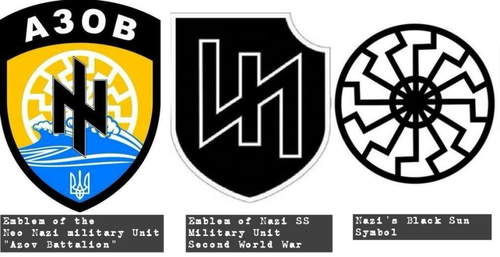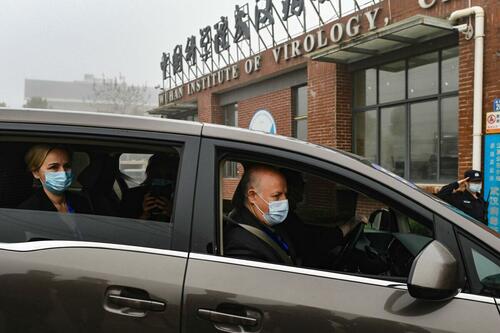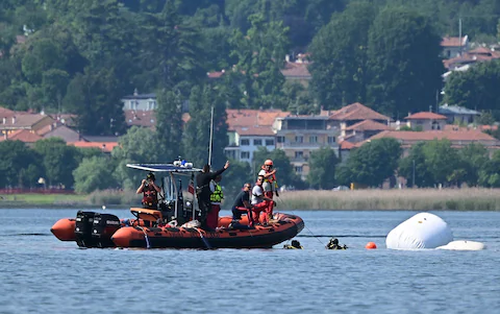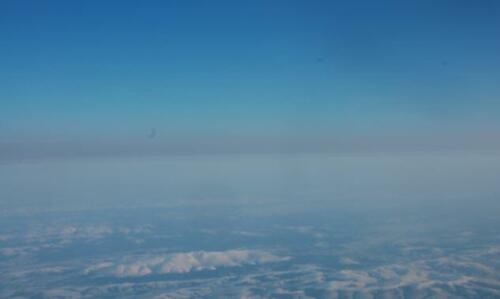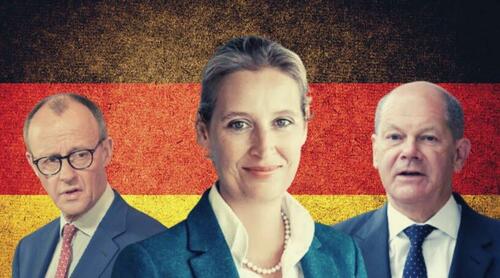Journalists Are Asking Ukrainian Soldiers To Hide Their Nazi Patches, NYT Admits
The New York Times has been forced to very, very belatedly deal with something which had long been obvious and known to many independent analysts and media outlets, but which has been carefully shielded from the mainstream masses in the West for obvious reasons.
The surprising Monday Times headline said that “Nazi Symbols on Ukraine’s Front Lines Highlight Thorny Issues of History.” This acknowledgement comes after literally years of primarily indy journalists and geopolitical commentators pointing out that yes indeed… Ukraine’s military and paramilitary groups, especially those operating in the east since at least 2014, have a serious Nazi ideology problem. This has been exhaustively documented, again, going back years. But the report, which merely tries to downplay it as a “thorny issue” of Ukraine’s “unique” “History” – suggests that the real problem for Western PR is fundamentally that it’s being displayed so openly. Ukrainian troops are being asked to cover those Nazi symbols please!–as Matt Taibbi sarcastically quipped in commenting on the report.
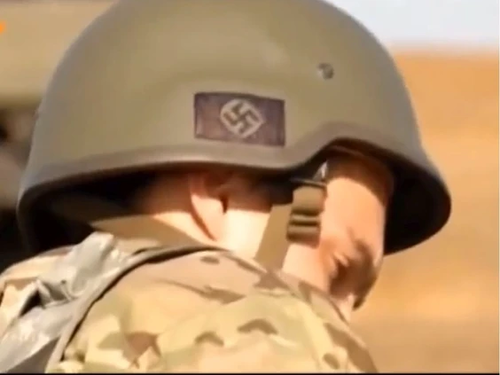
The authors of the NYT report begin by expressing frustration over the optics of Nazi symbols being displayed so proudly on many Ukrainian soldiers’ uniforms. Suggesting that many journalistic photographs which have in some cases been featured in newspapers and media outlets worldwide (typically coupled with generally positive articles on Ukraine’s military) are merely ‘unfortunate’ or misleading, the NYT report says, “In each photograph, Ukrainians in uniform wore patches featuring symbols that were made notorious by Nazi Germany and have since become part of the iconography of far-right hate groups.”
The report admits this has led to controversy wherein news rooms actually must delete some photos of Ukrainian soldiers and militants. “The photographs, and their deletions, highlight the Ukrainian military’s complicated relationship with Nazi imagery, a relationship forged under both Soviet and German occupation during World War II,” continues the report.
So it’s merely “thorny” and “complicated” we are told. Below is a small sampling of the kinds of patches that appear on Ukrainian military uniforms with “some regularity” – in the words of The New York Times:
NATO itself has in the recent past been forced to delete images on its official social media accounts due to Nazi imagery being present among Ukrainian troops during photo shoots.
NATO quickly deleted a tweet yesterday that featured a photo of a Ukrainian soldier wearing the Neo-Nazi Black sun patch. Remember we’re constantly told that neo Nazis in Ukraine are an insignificant fringe and if you point to it, you’re a Putin stooge or worse. https://t.co/CPkdvl1T0b
— Rupa Subramanya (@rupasubramanya) March 9, 2022
The following line from the report says everything you need to know about the so-called “paper of record” and its one-sided and ultra-simplistic coverage of what many are finally waking up to realize is a war with a deeply complex reality (to say the least), and far from the MSM’s goodies vs. baddies Hollywoodesque narrative of Putler vs. the free world which is typical of networks from CNN to Fox to NBC…
From the NY Times:
“In November, during a meeting with Times reporters near the front line, a Ukrainian press officer wore a Totenkopf variation made by a company called R3ICH (pronounced “Reich”). He said he did not believe the patch was affiliated with the Nazis. A second press officer present said other journalists had asked soldiers to remove the patch before taking photographs.”
Oops!
This is Schrödinger’s New York Times:
Azov, which the newspaper correctly described as a “Ukrainian neo-Nazi paramilitary organization” in 2019, is now a cuddly “pro-democracy” group of moderate rebelshttps://t.co/rz1ZgNWdB8
— Ben Norton (@BenjaminNorton) June 5, 2023
And now we might expect some significant efforts at damage control, or even perhaps we’re witnessing the beginnings of evolving definitions and the moving of goalposts. More from NY Times [emphasis ZH]:
But some members of these groups have been fighting Russia since the Kremlin illegally annexed part of the Crimea region of Ukraine in 2014 and are now part of the broader military structure. Some are regarded as national heroes, even as the far-right remains marginalized politically.
The iconography of these groups, including a skull-and-crossbones patch worn by concentration camp guards and a symbol known as the Black Sun, now appears with some regularity on the uniforms of soldiers fighting on the front line, including soldiers who say the imagery symbolizes Ukrainian sovereignty and pride, not Nazism.
Some are writing more appropriate and apt headlines for the NYT story…
Alternate headline:
The West Has Blatantly Whitewashed Ukraine’s Nazi Elements to Fight Russia https://t.co/MTdBxZR4Ua
— Max Abrahms (@MaxAbrahms) June 5, 2023
Only very recently Ukraine’s Defense Ministry and even President Zelensky’s office was caught in the act:
In April, Ukraine’s Defense Ministry posted a photograph on its Twitter account of a soldier wearing a patch featuring a skull and crossbones known as the Totenkopf, or Death’s Head. The specific symbol in the picture was made notorious by a Nazi unit that committed war crimes and guarded concentration camps during World War II.
The patch in the photograph sets the Totenkopf atop a Ukrainian flag with a small No. 6 below. That patch is the official merchandise of Death in June, a British neo-folk band that the Southern Poverty Law Center has said produces “hate speech” that “exploits themes and images of fascism and Nazism.”
To be expected, the Times still tries to run cover while desperately seeking to ‘reassure’ its audience by writing that “In the short term, that threatens to reinforce Putin’s propaganda and giving fuel to his false claims that Ukraine must be ‘de-Nazified’ — a position that ignores the fact that Ukrainian President Volodymyr Zelenskyy is Jewish.”
New levels of cope indeed…
NYT inventing new levels of cope:
Nazi iconography has “meanings unique to Ukraine.”
Nazi symbols “should be interpreted by how Ukrainians viewed them, not by how they had been used elsewhere.” pic.twitter.com/eKzdPtRMZA
— Clint Ehrlich (@ClintEhrlich) June 5, 2023
But then still, the NYT concedes awkwardly, “More broadly, Ukraine’s ambivalence about these symbols, and sometimes even its acceptance of them, risks giving new, mainstream life to icons that the West has spent more than a half-century trying to eliminate.”
Tyler Durden
Tue, 06/06/2023 – 06:30
via ZeroHedge News https://ift.tt/TwbBFQ1 Tyler Durden
